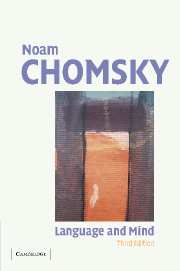Book contents
- Frontmatter
- Contents
- Preface to the third edition
- Preface to the second edition
- Preface to the first edition
- 1 Linguistic contributions to the study of mind: past
- 2 Linguistic contributions to the study of mind: present
- 3 Linguistic contributions to the study of mind: future
- 4 Form and meaning in natural languages
- 5 The formal nature of language
- 6 Linguistics and philosophy
- 7 Biolinguistics and the human capacity
- Index
7 - Biolinguistics and the human capacity
Published online by Cambridge University Press: 04 September 2012
- Frontmatter
- Contents
- Preface to the third edition
- Preface to the second edition
- Preface to the first edition
- 1 Linguistic contributions to the study of mind: past
- 2 Linguistic contributions to the study of mind: present
- 3 Linguistic contributions to the study of mind: future
- 4 Form and meaning in natural languages
- 5 The formal nature of language
- 6 Linguistics and philosophy
- 7 Biolinguistics and the human capacity
- Index
Summary
I would like to say a few words about what has come to be called “the biolinguistic perspective,” which began to take shape half a century ago in discussions among a few graduate students who were much influenced by developments in biology and mathematics in the early postwar years, including work in ethology that was just coming to be known in the United States. One of them was Eric Lenneberg, whose seminal 1967 study Biological Foundations of Language remains a basic document of the field. By then considerable interchange was proceeding, including interdisciplinary seminars and international conferences. The most far-reaching one, in 1974, was called, for the first time, “Biolinguistics.” Many of the leading questions discussed there remain very much alive today.
One of these questions, repeatedly brought up as “one of the basic questions to be asked from the biological point of view,” is the extent to which apparent principles of language, including some that had only recently come to light, are unique to this cognitive system. An even more basic question from the biological point of view is how much of language can be given a principled explanation, whether or not homologous elements can be found in other domains or organisms. The effort to sharpen these questions and to investigate them for language has come to be called “the minimalist program” in recent years, but the questions arise for any biological system, and are independent of theoretical persuasion, in linguistics and other domains.
- Type
- Chapter
- Information
- Language and Mind , pp. 173 - 185Publisher: Cambridge University PressPrint publication year: 2006
- 1
- Cited by



